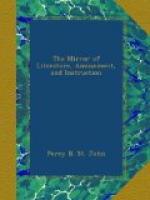There is no intention in these remarks to shew the extent of production of which the soil and climate are capable; time and prosperity will be requisite to bring forward all their capabilities. Nothing, therefore, has been said of the articles grown in similar latitudes in Asia, and carried to Smyrna and other Turkish ports at immense distances, for export to England, France, and Holland. There is, however, no reason for supposing that silk, (equal to that of Brussa,) opium, madder roots, goats’ wool, senna, gums, currants, raisins, and the highly esteemed Turkish tobacco, and various other productions, may not be cultivated to advantage half a century hence. But in the commencement, it is sufficient to look to early, certain, and profitable returns; without calculating upon chances of wealth, which may not be realized in the lifetime of the present adventurers.
It remains only for us to offer a word of advice (says the writer in the Quarterly Review) to the multitudes who we understand are preparing to take their flight to this new land of Goshen,—which is this: that no one should at present think of venturing on such a step, unless he can carry out with him, either in his own person or in his family or followers, the knowledge of agriculture, and the capability of agricultural labour. It is quite certain that, for the first few years, every settler must be mainly indebted for the means of subsistence of himself and family to the produce of the soil; beyond this the country itself, for the first year, will afford him nothing, with the exception, perhaps, of a little fish—the rest must be raised by the labour of the ploughman and the horticulturist. The only settlers, therefore, who can reasonably hope to thrive in the infant state of the colony must consist of this description of persons; any others, with very few exceptions, must inevitably be disappointed, if not irretrievably ruined. A clergyman, a schoolmaster, a land-surveyor, an apothecary, a few small tradesmen and fishermen, may reasonably expect employment and make themselves useful to the new community; as will also a limited number of house-carpenters, joiners, bricklayers, black-smiths, tailors, shoemakers, and common labourers, the latter being required to assist in building habitations; but the unproductive class, or idlers, had better wait a few years before they embark for a country where, as yet, there is neither hut nor hovel, and where the “fruges consumere nati” have unquestionably no place in society. We cannot forget what happened, when, a few years ago, the government resolved to send out, at a very considerable expense, a number of new settlers to improve and extend the agriculture of the Cape of Good Hope; giving allowances to the heads of parties, proportioned to their respective numbers.




